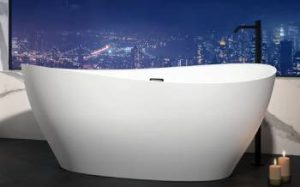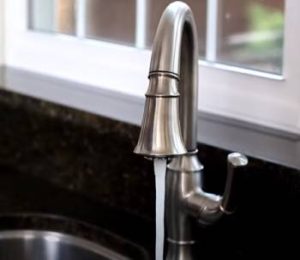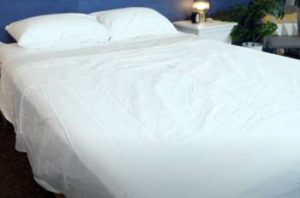In the world of DIY home improvements, every homeowner seeks out the best materials for their projects. Today, we’re diving into the world of backsplash adhesives.
We’re putting two heavyweights head to head: Simple Mat and MusselBound. So, let’s get ready to rumble in the DIY backsplash ring!
A Brief Comparison Table
| Features | Simple Mat | MusselBound |
| Ease of Use | High | Medium |
| Strength | Medium | High |
| Durability | Medium | High |
| Timing Flexibility | High | High |
| Water Resistance | Medium | High |
| Cost | Medium | Medium |
| Tile Repositioning | Easy | Challenging |
Simple Mat: Uncomplicated and Effective
Simple Mat, as its name suggests, is a simple yet effective adhesive for tile backsplashes. Renowned for its ease of use, Simple Mat is beloved by DIY enthusiasts and professionals alike.
- Pros of Simple Mat
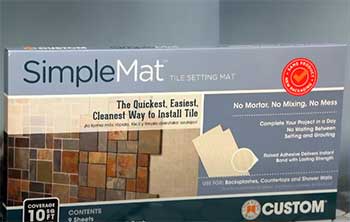
The main advantage of Simple Mat is its simplicity.
It comes as a double-sided adhesive mat, easy to cut, position, and reposition until you have it just right.
Plus, there’s no need for mixing or spreading as you would with traditional mortar, making the process clean and fast.
Moreover, Simple Mat promises immediate grab and long-term bond, so there’s no need to wait for the adhesive to set before you grout. For a fast-paced project, this can be a game-changer.
It’s also versatile, working with all types of tiles, including glass, ceramic, and stone.
- Cons of Simple Mat
While Simple Mat is a great product, it isn’t without its drawbacks. For one, it’s not as strong as some other adhesive solutions.
Heavy or larger tiles may require additional support during installation. Moreover, some users have reported difficulty with vertical applications.
Another downside is the cost. Simple Mat is a bit pricier than traditional mortar, so if budget is a big concern, you might want to look at other options.
MusselBound: Strength and Flexibility
Next up, we have MusselBound, another adhesive tile mat. MusselBound, however, touts its strength and flexibility, making it a formidable competitor to Simple Mat.
- Pros of MusselBound
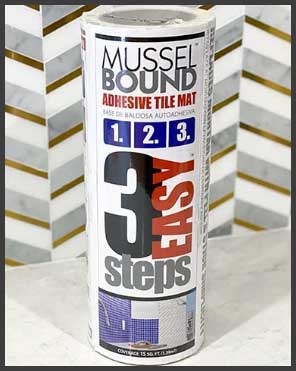
The foremost selling point of MusselBound is its sheer strength.
Users report that it holds tiles firmly, making it excellent for larger or heavier tiles.
It’s particularly great for vertical applications where gravity is not on your side.
Furthermore, MusselBound is water-resistant, which makes it suitable for areas prone to moisture like showers and kitchen backsplashes.
It also offers the flexibility of grouting immediately or waiting, allowing for a more flexible schedule.
- Cons of MusselBound
However, MusselBound isn’t perfect either. Its main downside is that it can be challenging to reposition tiles once they’re placed. While it’s not impossible, it’s certainly more difficult than with Simple Mat.
Cost-wise, MusselBound and Simple Mat are in the same ballpark, so for those watching their pennies, neither product will offer a significant advantage.
Key Differences Between Simple Mat And MusselBound
In the throes of making a decision between Simple Mat and MusselBound, it’s crucial to highlight their key differences. These variances might make one a better choice for you over the other.
- Ease of Use
Both products are undoubtedly easier to use than traditional mortar. But Simple Mat edges out MusselBound in terms of tile repositioning. Once you’ve placed a tile onto the MusselBound mat, it’s challenging to move it, whereas Simple Mat offers a bit more forgiveness in this regard.
- Strength and Durability
Here, MusselBound takes the lead. Its adhesive strength is superior to that of Simple Mat. So, if you’re dealing with larger or heavier tiles, MusselBound may provide more assurance of a lasting bond. This quality also makes MusselBound more suitable for vertical applications.
- Timing Flexibility
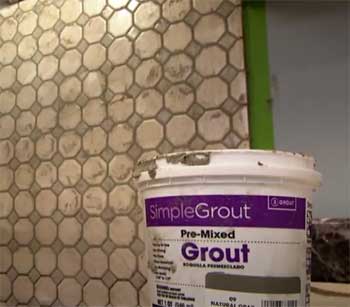
Both products offer the convenience of grouting immediately after tile placement.
However, MusselBound’s adhesive strength grants you more flexibility.
With Simple Mat, it’s recommended to grout immediately to help secure the tiles in place.
With MusselBound, you could, if needed, wait a bit longer to grout, making your project schedule more flexible.
- Water Resistance
While both products can be used in areas prone to moisture, MusselBound’s superior water resistance makes it a better choice for showers or areas where the backsplash may be frequently splashed.
- Cost
In terms of cost, there isn’t a significant difference between Simple Mat and MusselBound. Both are pricier than traditional mortar, so it comes down to preference and needs rather than budget.
The Final Verdict
Both Simple Mat and MusselBound have unique benefits that may sway your decision one way or another. If you value ease-of-use and the ability to reposition tiles, then Simple Mat might be the best choice for you.
On the other hand, if you’re working with larger tiles or vertical applications, then MusselBound’s strength and durability may be more appealing.
Ultimately, the best choice between Simple Mat and MusselBound comes down to your specific project needs and personal preferences. Both offer excellent solutions for DIY tile projects, each with its strengths and limitations.
Now that you’re armed with this information, you’re one step closer to creating your dream backsplash!
Remember, a well-planned project is half the battle, and choosing the right adhesive can significantly impact the outcome. So, whether you choose Simple Mat or MusselBound, you’re well on your way to a successful DIY adventure.

